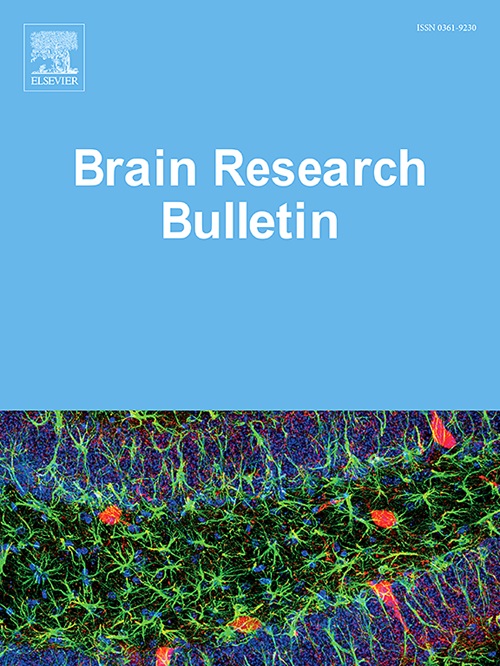The effects of autologous fecal microbiota transplantation on fear memory and anxiety abnormalities induced by single prolonged stress – Implication of gut-brain axis regulation
IF 3.7
3区 医学
Q2 NEUROSCIENCES
引用次数: 0
Abstract
Increasing evidence suggests that alterations in the gut microbiota play a crucial role in the pathophysiology of psychiatric disorders, including post-traumatic stress disorder (PTSD). This implies that restoring gut microbiota might serve as a therapeutic strategy, with autologous fecal microbiota transplantation (FMT) being the most promising treatment due to its effectiveness and fewer pharmacological side effects. However, the hypothesis that adjusting gut microbiota may help to restore the impairment of fear memory is still less examined. To evaluate this hypothesis, we employed single prolonged stress (SPS) rat model to examine the impact of autologous FMT on PTSD-related fear memory extinction retention deficits and increased anxiety, and to investigate changes in the levels of gut microbiota, central monoamines, and plasma corticosterone. The correlations between gut microbiota and central serotonin (5-HT) with fear extinction retention deficits and anxiety were analyzed. Note that littermates were used in the gut microbiota analysis to minimize individual differences. Our results demonstrated that autologous FMT significantly ameliorated SPS-induced deficits in fear extinction retention and conditioned anxiety but did not mitigate unconditioned anxiety. These improvements were significantly correlated with the restoration of 5-HT levels in the medial prefrontal cortex (mPFC), dorsal hippocampus (dHPC), and hypothalamus (HT). Autologous FMT also reversed SPS-induced reductions in plasma corticosterone level. Additionally, fecal microbiota analysis revealed significant changes at the genus level, with the relative abundance of the Prevotellaceae Ga6A1 group reduced after SPS, and Intestinimonas increased by FMT, as well as some taxa significantly correlated with fear extinction retention deficits. This study suggests that autologous FMT offers potential as a novel therapeutic strategy for PTSD.
自体粪便微生物群移植对单次长时间应激诱导的恐惧记忆和焦虑异常的影响——肠-脑轴调节的意义。
越来越多的证据表明,肠道微生物群的改变在包括创伤后应激障碍(PTSD)在内的精神疾病的病理生理学中起着至关重要的作用。这意味着恢复肠道微生物群可能作为一种治疗策略,而自体粪便微生物群移植(FMT)由于其有效性和较少的药物副作用而成为最有希望的治疗方法。然而,调节肠道微生物群可能有助于恢复恐惧记忆受损的假设仍然很少得到检验。为了验证这一假设,我们采用单延长应激(SPS)大鼠模型来研究自体FMT对ptsd相关恐惧记忆消退保留缺陷和焦虑增加的影响,并研究肠道微生物群、中枢单胺和血浆皮质酮水平的变化。分析了肠道菌群和中枢血清素(5-HT)与恐惧消退保留缺陷和焦虑的相关性。注意,在肠道微生物群分析中使用了窝哥们,以尽量减少个体差异。我们的研究结果表明,自体FMT显著改善了sps诱导的恐惧消退保留和条件焦虑的缺陷,但没有减轻非条件焦虑。这些改善与内侧前额叶皮层(mPFC)、海马背侧(dHPC)和下丘脑(HT) 5-HT水平的恢复显著相关。自体FMT也逆转了sps诱导的血浆皮质酮水平的降低。此外,粪便微生物群分析显示,在属水平上发生了显著变化,SPS后Prevotellaceae Ga6A1组的相对丰度降低,FMT后肠子单胞菌的相对丰度增加,以及一些与恐惧灭绝保留缺陷显著相关的类群。本研究提示自体FMT作为一种新的创伤后应激障碍治疗策略具有潜力。
本文章由计算机程序翻译,如有差异,请以英文原文为准。
求助全文
约1分钟内获得全文
求助全文
来源期刊

Brain Research Bulletin
医学-神经科学
CiteScore
6.90
自引率
2.60%
发文量
253
审稿时长
67 days
期刊介绍:
The Brain Research Bulletin (BRB) aims to publish novel work that advances our knowledge of molecular and cellular mechanisms that underlie neural network properties associated with behavior, cognition and other brain functions during neurodevelopment and in the adult. Although clinical research is out of the Journal''s scope, the BRB also aims to publish translation research that provides insight into biological mechanisms and processes associated with neurodegeneration mechanisms, neurological diseases and neuropsychiatric disorders. The Journal is especially interested in research using novel methodologies, such as optogenetics, multielectrode array recordings and life imaging in wild-type and genetically-modified animal models, with the goal to advance our understanding of how neurons, glia and networks function in vivo.
 求助内容:
求助内容: 应助结果提醒方式:
应助结果提醒方式:


